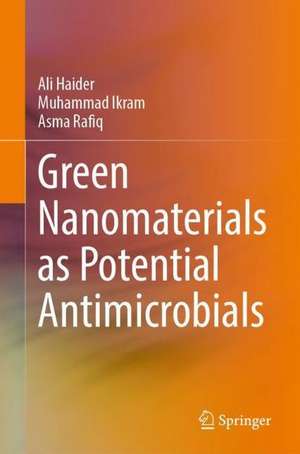Green Nanomaterials as Potential Antimicrobials
Autor Ali Haider, Muhammad Ikram, Asma Rafiqen Limba Engleză Hardback – 11 noi 2022
| Toate formatele și edițiile | Preț | Express |
|---|---|---|
| Paperback (1) | 938.34 lei 6-8 săpt. | |
| Springer International Publishing – 12 noi 2023 | 938.34 lei 6-8 săpt. | |
| Hardback (1) | 944.19 lei 6-8 săpt. | |
| Springer International Publishing – 11 noi 2022 | 944.19 lei 6-8 săpt. |
Preț: 944.19 lei
Preț vechi: 1151.45 lei
-18% Nou
Puncte Express: 1416
Preț estimativ în valută:
180.69€ • 187.95$ • 149.17£
180.69€ • 187.95$ • 149.17£
Carte tipărită la comandă
Livrare economică 14-28 aprilie
Preluare comenzi: 021 569.72.76
Specificații
ISBN-13: 9783031187193
ISBN-10: 3031187199
Pagini: 139
Ilustrații: XXIII, 139 p. 26 illus., 20 illus. in color.
Dimensiuni: 155 x 235 mm
Greutate: 0.41 kg
Ediția:1st ed. 2023
Editura: Springer International Publishing
Colecția Springer
Locul publicării:Cham, Switzerland
ISBN-10: 3031187199
Pagini: 139
Ilustrații: XXIII, 139 p. 26 illus., 20 illus. in color.
Dimensiuni: 155 x 235 mm
Greutate: 0.41 kg
Ediția:1st ed. 2023
Editura: Springer International Publishing
Colecția Springer
Locul publicării:Cham, Switzerland
Cuprins
Introduction.- Fabrication of Nanomaterials.- Properties of Nanomaterials.- Characterization of Nanomaterials.- Introduction to Veterinary Bacteriology.- Antimicrobials; Drug Resistance.- Nanomaterials; Potential Antibacterial Agents.
Notă biografică
Dr. Ali Haider obtained his Master's degree (M. Phil, Clinical Medicine) from University of Veterinary and Animal Sciences (UVAS) Lahore, Pakistan, in 2016. He obtained his Ph.D. degree in Clinical Medicine from the Department of Veterinary Medicine (UVAS), Lahore, in 2021. He served as a dairy farm manager at reputed commercial dairies of Punjab, (Pakistan). Later on (Jan 2022 - to date), Ali joined the Department of Clinical Sciences, Faculty of Veterinary and Animal Sciences, Muhammad Nawaz Shareef University of Agriculture Multan (MNS-UAM) as an assistant professor of Clinical Medicine. His research interest involves the green synthesis and characterization of inorganic semiconductor nanomaterials, 2D materials for their catalytic, antiparasitic, and antibacterial evaluation against multiple drug-resistant (MDR) pathogens.
Dr. Muhammad Ikram obtained his Master's degree (M. Phil Physics) from BZU Multan, Pakistan, in 2010. He obtained his Ph.D. degree in Physics from the Department of Physics, Government College University (GCU) Lahore through the Pak-US joint project between the Department of Physics, GCU Lahore, Pakistan, and the University of Delaware, USA, in 2015. He served as a deputy director of Manuscript Science at Punjab textbook board (Pakistan). Later on (2017-to date), Ikram joined the Department of Physics, GC University Lahore as an assistant professor of Physics and Principal of Solar Cell Applications Lab. Ikram received the Seal of Excellence Marie Skłodowska Curie Actions Individual Fellowship in 2017 and 2020. In 2021, Ikram was included in the 2 % top scientists from Pakistan announced by Stanford University. His research interest involves the synthesis and characterization of inorganic semiconductor nanomaterials, 2D materials for water treatment, optoelectronic, and electrocatalytic applications.
Dr. Asma Rafiq obtained her Ph.D. degree in Physics from the Department of Physics, Government College University (GCU) Lahore, Pakistan. She served as a visiting lecturer at the Department of Physics, GCU Lahore (2016-2018). Asma joined Nanomagnetism and Spintronics research group at Durham University, UK, in 2018 as a visiting researcher. Later on, she joined the Department of Physics, Riphah International University, Lahore, as a research associate. Currently, she is serving as assistant professor at Centre of Excellence in Solid State Physics, University of the Punjab, Lahore. Her research interest involves the synthesis and characterization of inorganic semiconductor nanomaterials, evaluating their catalytic and photocatalytic properties.
Textul de pe ultima copertă
This book focuses on nanomaterials with antibacterial properties. Antibacterial resistance is a growing concern that poses a serious threat to public health worldwide. This book looks at the fabrication, material's properties, and characterization of a range of metallic, bimetallic, and metal-oxide-based nanomaterials that can be exploited for their antimicrobial properties. A key focus of this book is its emphasis on ‘green’ synthesis of nanomaterials, as many conventional routes of nanomaterial fabrication do not fulfill key sustainability criteria in terms of their toxicity and lack of eco-friendliness. Additionally, this book introduces the application of nanoparticles to veterinary medicine. Given the ever-increasing global livestock population coupled with the emergence of drug-resistant pathogens of animal origin (bacterial, parasitic, and hemoprotozoa), the use of nanoparticles as antibacterial agents represents a paradigm shift in every aspect of veterinary care. Authored by scholars with combined expertise in nanomaterials and veterinary medicine, this book provides valuable information for researchers working on sustainable nanomaterials with antibacterial properties.
Caracteristici
Introduces a range of metallic, bimetallic, and metal-oxide-based nanomaterials Compares various nanomaterials fabrication routes such as green synthesis and the sol-gel approach Gives timely focus to drug-resistant pathogens of veterinary origin and discusses the role of novel nanoparticles
